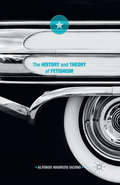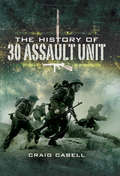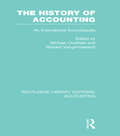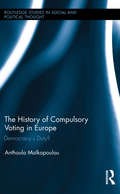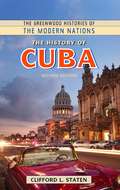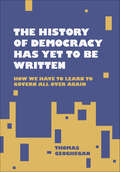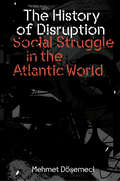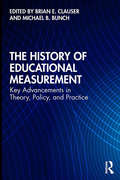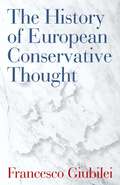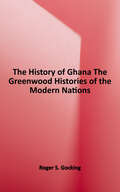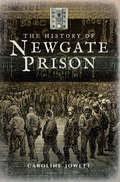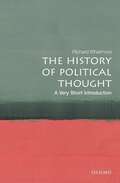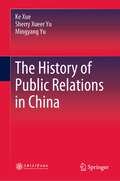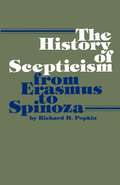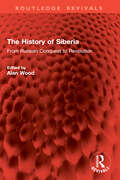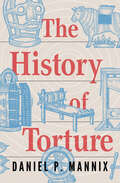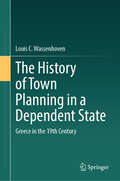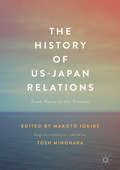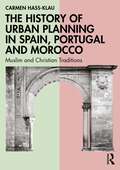- Table View
- List View
The History and Theory of Fetishism (Marx, Engels, and Marxisms)
by Alfonso Maurizio IaconoThe History and Theory of Fetishism, the expanded version of Iacono's enduring classic Teorie del feticismo and available for the first time in English, aims to provide the historical context necessary to understanding the concept of "fetishism" and offers an overview of the ideologies, prejudices, and critical senses that shaped the Western observer's view of otherness and of his own world. Iacono examines the moment when the Western observer turned his colonizing and evangelizing gaze to continents such as Africa and the Americas, while attempting to simultaneously destabilize and look at his own world critically.
The History of 30 Assault Unit: Ian Fleming's Red Indians
by Craig CabellThe Second World War spawned a plethora of crack special forces units (Long Range Desert Group, SAS, SBS, Phantom and Commandos) but 30 Assault Unit remains, even today, far more secretive and exclusive than the others. Formed by Ian Fleming, who was working for Naval Intelligence, 30 AUs mission was to penetrate and operate behind enemy lines, capture by whatever means necessary vital intelligence and feed it back to London where it could be assimilated and acted upon. This crack team of commandos included mavericks such as Patrick Dalzel-Job (generally regarded as the model for Flemings fictional secret agent 007), and less well known (despite their conspicuous bravery) figures such as Captains Huntingdon-Whiteley, Captain Martin-Smith. Lieutenant Commander Curtis and Lieutenant McFee. The author has trawled archives and interviewed veterans in order to piece together the history and record of this elusive special forces unit who fought with great distinction and achieved results disproportionate to their size.
The History of Accounting: An International Encylopedia (Routledge Library Editions: Accounting)
by Michael Chatfield Richard VangermeerschGlobal in scope, accounting has had its share of great thinkers and practitioners, from Luca Pacioloi, the father of accounting, to R. J. Chambers, W. W. Cooper, Yuji Ijiri, Stephen A. Zeff and other figures. This encyclopedia presents more than 400 entries that focus on such subjects as publications in the field, institutional bodies, accounting and economic concepts, accounting issues, authors in accounting, records, leaders in the profession, accounting in various countries, financial court cases, accounting exams and historical researchers.
The History of Air Intercept Radar & the British Nightfighter 1935–1959
by Ian WhiteREVIEWSan outstanding combination of the many aspects involved with air intercept radar the author is very successful in blending technical, operational and military aspects of the subjects into a very interesting book.Air Power History, Winter 2008
The History of American Foreign Policy: To 1920 (Xx Xx Ser.)
by Jerald A CombsNow thoroughly updated, this respected text provides a clear, concise, and affordable narrative and analytical history of American foreign policy from the revolutionary period to the present. This edition includes an all-new chapter on the George W. Bush presidency, 9/11, and the war in Iraq. The historiographical essays at the end of each chapter have been revised to reflect the most recent scholarship."The History of American Foreign Policy" chronicles events and policies with emphasis on the international setting and constraints within which American policy-makers had to operate; the domestic pressures on those policy-makers; and the ideologies, preferences, and personal idiosyncrasies of the leaders themselves. The new edition also provides expanded coverage of the role of cultural and intellectuual factors in setting up the problems faced by U.S. policy-makers, as well as new materials on globalization and the War on Terror.
The History of Compulsory Voting in Europe: Democracy's Duty? (Routledge Studies in Social and Political Thought)
by Anthoula MalkopoulouIs voting out of fashion? Does it matter if voters don't show up at the polls? If yes, is legal enforcement of voting compatible with democracy? These are just a few of the questions linked to the thorny problem of electoral abstention. This book addresses the hot question whether there is a duty to vote and if this is enforceable in the form of compulsory voting. Divided into two parts, Anthoula Malkopoulou begins by expertly presenting the importance of compulsory voting today, situating the debate within the contemporary discussion on liberty, equality and democracy. Then, she questions the historical origins of the idea in Europe. In particular, she examines parliamentary discussions and other primary sources from France and Greece, including a few additional insights from other countries like Switzerland and Belgium. Focusing especially on the years between 1870 and 1930, the reader learns about the historical actors of the debates, their efforts to legitimate punishment of abstention through normative arguments, but also their strategic motivations and political interests. While discussions at the beginning of the century focus on introducing compulsory voting, Malkopoulou criticizes its misuse after the Second World War, exposing the contingency of relevant normative claims today and the conditionality of compulsory voting. From ancient times until today, you learn about the ideological debates, their political context and how the problems of equal representation and democratic moderation persist through the ages.
The History of Cuba, Second Edition
by Clifford L. StatenA thorough examination of the history of Cuba, focusing primarily on the period from the revolution in 1959 to the present day. • Completely updates the original, top-selling volume with new information about issues, people, and events post-2003 • Analyzes the political landscape under Raul Castro's leadership • Helps readers to better understand a nation that is off-limits to American travelers―an inconceivable notion in today's day and age
The History of Democracy Has Yet to Be Written: How We Have to Learn to Govern All Over Again
by Thomas Geoghegan&“This book made me laugh out loud and also gave me glimpses of an entire horizon of possibility I hadn&’t seen before.&”—Chris Hayes, host of MSNBC&’s All In with Chris Hayes End the filibuster. Abolish the Senate. Make everyone vote. Only if we do this (and then some), says Thomas Geoghegan, might we heal our fractured democracy. In 2008, Geoghegan―then an established labor lawyer and prolific writer―embarked on a campaign to represent Chicago&’s Fifth District in Congress, in a special election called when Rahm Emanuel stepped down to serve as President Barack Obama&’s chief of staff. For ninety days leading up to the election, Geoghegan, a political neophyte at age sixty, knocked on doors, shook hands at train stations, and made fundraising calls. On election night he lost, badly. But this humbling experience helped him develop a framework for reimagining American government in a way that is truly just, fair, and constitutional. Taking its title from Walt Whitman, The History of Democracy Is Yet to Be Written: How We Have to Learn to Govern All Over Again, combines hilarious tales from his time on the campaign trail with an incisive vision of how we might be able to create an America that fulfills its great promise. In a polarized country, where 100 million citizens don&’t vote, and those who do are otherwise rarely politically engaged, he makes an impassioned case for the possibility of a truly representative democracy, one built on the ideals of the House of Representatives, the true chamber of the people, and inspired by the poet who gives the book its name. At once an engaging memoir and a call to arms, The History of Democracy Is Yet to Be Written will inspire and invigorate political veterans and young activists alike. &“Witty, succinct . . . morally incisive.&” —Rick Perlstein, New York Times–bestselling author of Reaganland &“Geoghegan&’s punchy political memoir-and-manifesto is hilarious, poignant, and rippling with strong ideas and practical hope for change.&” —Congressman Jamie Raskin
The History of Development: From Western Origins to Global Faith (Development Essentials)
by Patrick Camiller Gilbert RistIn this landmark text, Gilbert Rist provides a comprehensive and compelling overview of what the idea of development has meant throughout history. He traces it from its origins in the Western view of history, through the early stages of the world system, the rise of US hegemony, and the supposed triumph of third-worldism, through to new concerns about the environment and globalization. <p><p>Assessing possible post-development models and considering the ecological dimensions of development, Rist contemplates the ways forward. Throughout, he argues persuasively that development has been no more than a collective delusion, which in reality has resulted only in widening market relations, whatever the intentions of its advocates. <p><p>A classic development text written by one of the leaders of post-development theory.
The History of Disruption: Social Struggle in the Atlantic World
by Mehmet DosemeciChallenging our understanding of social struggles as movements, Mehmet Dösemeci traces a 300-year counter-history of struggle predicated on disruptionWhy do we think of social struggles as movements? Have struggles been practiced otherwise, not as motion but as interruption, occupation, disturbance, arrest? Looking at three hundred years of Atlantic social struggle kinetically, Mehmet Dösemeci questions the axiomatic association that academics and activists have made between modern social struggles and the category of movement. Dösemeci argues that this movement politics has privileged some forms of historical struggle while obscuring others and, perhaps more damningly, reveals the complicity of social movements in the very forces they oppose.Dösemeci&’s story begins with the eighteenth-century establishment of a transatlantic regime of movement that coerced goods and bodies into violent and ceaseless motion. He then details the long history of resistance to this regime, interweaving disparate social struggles such as food riots, Caribbean maroon communities, Atlantic pirates, secret societies and syndicalism, the student New Left, Black Power, radical feminism, Operaismo, and the Zapatistas into a history of politics as disruption. Dösemeci convincingly argues that this history is key to understanding the resurgence of disruptive politics in the twenty-first century and offers valuable guidance for future struggles seeking to overturn an ever-intensifying regime of movement.
The History of Educational Measurement: Key Advancements in Theory, Policy, and Practice
by Brian E. ClauserThe History of Educational Measurement collects essays on the most important topics in educational testing, measurement, and psychometrics. Authored by the field’s top scholars, this book offers unique historical viewpoints, from origins to modern applications, of formal testing programs and mental measurement theories. Topics as varied as large-scale testing, validity, item-response theory, federal involvement, and notable assessment controversies complete a survey of the field’s greatest challenges and most important achievements. Graduate students, researchers, industry professionals, and other stakeholders will find this volume relevant for years to come.
The History of Educational Measurement: Key Advancements in Theory, Policy, and Practice
by Brian E. ClauserThe History of Educational Measurement collects essays on the most important topics in educational testing, measurement, and psychometrics. Authored by the field’s top scholars, this book offers unique historical viewpoints, from origins to modern applications, of formal testing programs and mental measurement theories. Topics as varied as large-scale testing, validity, item-response theory, federal involvement, and notable assessment controversies complete a survey of the field’s greatest challenges and most important achievements. Graduate students, researchers, industry professionals, and other stakeholders will find this volume relevant for years to come.
The History of European Conservative Thought
by Francesco GiubileiModern conservatism was born in the crisis of the French Revolution that sought to overturn Christianity, monarchy, tradition, and a trust in experience rather than reason. In the name of reason and progress, the French Revolution led to the guillotine, the dictatorship of Napoleon Bonaparte, and a decade of continental war. Today Western Civilization is again in crisis, with an ever-widening progressive campaign against religion, tradition, and ordered liberty; Francesco Giubilei's cogent reassessment of some of conservatism's greatest thinkers could not be timelier. Within these pages, English-speaking readers will come across some familiar names: Burke, Disraeli, Chesterton, and Scruton. Americans get their own chapter too, including penetrating examinations of John Adams, Richard Weaver, Henry Regnery, Robert Nisbet, Russell Kirk, William F. Buckley Jr., and Barry Goldwater. But perhaps most interesting is Giubilei's coverage of the continental European tradition–largely Catholic, monarchical, traditionalist, and anti-Jacobin, anti-Communist, and anti-Fascist. Giubilei offers insightful intellectual portraits of statesmen and philosophers like Count Klemens von Metternich, the man who restored Europe after the Napoleonic Wars; Eric Voegelin, the German political philosopher who made his career in America and traced recurrent strains of leftism to an early Christian heresy; Joseph de Maistre, the leading French counterrevolutionary philosopher; George Santayana, a Spaniard who became an American philosopher and conservative pragmatist; Jose Ortega y Gasset, who warned of the "revolt of the masses"; and a wide variety of Italian thinkers whose conservatism was forged against a Fascist ideology that presented itself as a force for stability and respect for the past, but that was fundamentally modernist and opposed to conservatism. Unique and written by one of Italy's youngest and brightest conservative thinkers, Francesco Giubilei's History of European Conservative Thought is sure to enlighten and inform.
The History of Ghana: Greenwood Histories of the Modern Nations
by Roger S. GockingGocking provides a historical overview of Ghana from the emergence of precolonial states through increasing contact with Europeans that led to the establishment of formal colonial rule by Great Britain at the end of the 19th century. Colonial rule transformed what was known as the Gold Coast economically, socially, and politically, but it contained the seeds of its own demise. After World War II an increasingly more effective nationalist movement challenged British rule, and in 1957 Ghana became independent. Independence brought its own challenges the most important of which was the inability to maintain political stability. Within the space of 24 years there were four military coups and the collapse of three republics. Ghana's Fourth Republic, established in 1993, has dealt with the legacy of instability inherited from the past as it moves towards a more stable future. A timeline, photographs, maps, and an appendix of biographies of notable figures in the history of Ghana are included. Students and adults alike will find this book to be highly effective in describing this country's often turbulent and tumultuous history.
The History of Human Rights: From Ancient Times to the Globalization Era
by Micheline R. IshayMicheline Ishay recounts the dramatic struggle for human rights across the ages in a book that brilliantly synthesizes historical and intellectual developments from the Mesopotamian Codes of Hammurabi to today's era of globalization.
The History of Newgate Prison
by Caroline JowettA history of the iconic London prison, featuring insights on daily life, the evolution of prison systems, and famous inmates.As the place where prisoners, male and female, awaited trial, execution, or transportation Newgate was Britain’s most feared gaol for over 700 years. It probably best known today from the novels of Charles Dickens including Barnaby Rudge and Great Expectations.But there is much is more to Newgate than nineteenth century notoriety. In the seventeenth century it saw the exploits of legendary escaper and thief Jack Sheppard. Among its most famous inmates were author Daniel Defoe who was imprisoned there for seditious libel, playwright Ben Jonson for murder, and the Captain Kidd for piracy.This book takes you from the gaol’s 12th century beginnings to its final closure in 1904 and looks at daily life, developments in the treatment of prisoners from the use of torture to penal reform as well as major events in its history.Praise for The History of Newgate Prison“An amazing, entertaining and informative book!” —Books Monthly“This is a highly readable and accessible account, not only of the iconic institution, but also of the history of crime and punishment. It is packed full of evocative detail and is essential reading for all those interested in crime history.” —Who Do You Think You Are? magazine
The History of Political Thought: A Very Short Introduction (Very Short Introductions Ser.)
by Richard WhatmoreThinking about politics has tended to be historical in nature because of the comparisons and contrasts that can be drawn between past and present. Different periods in politics have used the past differently. At times political thought can be said to have been drawn directly from the study of history; at others, perhaps including our own time, the relationship is more indirect. This Very Short Introduction explores the core concerns and questions in the field of the history of political thought. Richard Whatmore considers the history of political thought as a branch of political philosophy/political science, and examines the approaches of core theorists such as Reinhart Koselleck, Strauss, Michel Foucault, and the so-called Cambridge School of Quentin Skinner and John Pocock. Assessing the current relationship between political history, theory and action, Whatmore concludes with an analysis of its relevance for current politics.
The History of Public Relations in China
by Ke Xue Mingyang Yu Sherry Xueer YuThis book is the first on the history of Chinese public relations, and has been selected as one of the “40 representative books for 40 years of public relations in China” by the Public Relations Society of China. In four chapters, it systematically reviews and analyzes the trajectory and evolution of public relations in China from the very start – when the “reform and opening” policy was adopted in 1978 – to the present.The book will help both established and new scholars and practitioners in the field to understand the changing nature of public relations in China. It offers a unique perspective by placing the discussion of the development of public relations in the general context of the changes and development of China as a whole, and in relation to the changing status of public relations around the world. Accordingly, readers will not only gain a more in-depth understanding of the history of the field, but also of the political, economic, societal, cultural and scientific development of China in modern times.
The History of Scepticism from Erasmus to Spinoza
by Richard H. Popkin"I had read the book before in the shorter Harper Torchbook edition but read it again right through--and found it as interesting and exciting as before. I regard it as one of the seminal books in the history of ideas. Based on a prodigious amount of original research, it demonstrated conclusively and in fascinating details how the transmission of ancient skepticism was a bital factor in the formation of modern thought. The story is rich in implications for th history of philosophy, the history of science, and the history of religious thought. Popkin's work has already inspired further work by others--and the new edition takes account of this, most importantly the work of Charles Schmitt. The two new chapters extend the story as far as Spinoza, with special reference to the beginnings of biblical criticism. . . . Popkin's history is of great potential interest to a wide readership--wider than most specialist publications and wider than it has (so far as I can tell) reached hitherto."--M.F. Burnyeat, Professor of Philosophy, University College London
The History of Siberia: From Russian Conquest to Revolution (Routledge Revivals)
by Alan WoodRussia’s vast Asian territories beyond the Urals, traditionally known as Siberia, have, despite their enormous size and the crucial role they played in the development of Russian state and society, attracted little attention from Western scholars.Drawing together the research of Western and Soviet historians, The History of Siberia (originally published in 1991) examines the ways in which the development of Siberia has been inextricably linked with the historical evolution of the Russian Empire as a whole. Among the topics discussed are Russia’s early conquest, exploration and the colonial administration of Siberia and its indigenous people; the fate of Russian America; peasant migration and settlement; Siberia’s role as a penal colony and its part in the Russian Revolution and Civil War. A final chapter evaluates Siberia’s role in the twentieth century. This book will be of interest to students and researchers of history.
The History of Torture
by Daniel P. MannixThe author of The Way of the Gladiator continues his exploration of the dark side of history with this grisly account of pain and punishment through the ages. Human beings have a deep-seated instinct for cruelty, and, so far, have not evolved much past it. History is rife with examples of the infliction of pain used as penalty or execution. In The History of Torture, Daniel P. Mannix takes you from the crucifixions of ancient Rome, to the hanging of women during the Salem witch trials, to the atrocities discovered at Nazi concentration camps. The act of torture has shifted from simple barbarism to advanced psychological techniques thanks to science and technology. Now it&’s not just an actual flogging that will have a prisoner spilling his guts, but law enforcement&’s coercive tactics that might prompt a confession. Follow Mannix as he: leads you into the chambers of Inquisitors, who elevated torture to an art form; illuminates the myriad miseries of the slave trade, America&’s greatest contribution to the torture hall of fame; and explains the most terrible and famous of all Chinese tortures, the Ling-chez or &“death of a thousand cuts.&” No country or culture is spared in this wide-reaching survey of suffering.
The History of Town Planning in a Dependent State: Greece in the 19th Century
by Louis C. WassenhovenThis book is based on research carried out by the author in Greece, addressed initially to Greek readers, mainly researchers of the Department of Urban and Regional Planning, National Technical University of Athens, where he served for a long time as professor. However, a great deal of the research has a definite international interest and its results form the backbone of his new undertaking in English. Although some of the observations included in the initial project are reproduced here, the gist of the author&’s arguments dwells on issues which are not of a narrow national interest. This book interests students and historians of town planning, whose area of reference is not only Europe, but also the countries which have been through a state of dependence and external domination, and had to import foreign planning ideas and concepts. The author tries to embrace a broad spectrum of urban planning ideas, developments and influences which dominated the 19th century planning practice of a country which had just achieved political independence, but was still practically a protectorate of the great powers of the time, often referred to as the Protecting Powers (Great Britain, France and Russia). Every aspect of domestic policies and developments was directly dictated or indirectly influenced by the choices, policies, laws and actions of these external forces. It was also influenced by the advice and expert opinions of foreigners or even of Greeks, whose mode of conceptualizing the problems of the dependent country had been deeply affected by their life or education in foreign lands. Looking at this state of affairs more than two centuries after the 1821 Greek War of Independence demands full awareness of these conditions.
The History of US-Japan Relations
by Tosh Minohara Makoto IokibeExamining the 160 year relationship between America and Japan, this cutting edge collection considers the evolution of the relationship of these two nations which straddle the Pacific, from the first encounters in the 19th century to major international shifts in a post 9/11 world. It examines the emergence of Japan in the wake of the 1905 Russo-Japanese War and the development of U. S. policies toward East Asia at the turn of the century. It goes on to study the impact of World War One in Asia, the Washington Treaty System, the issue of Immigration Issue and the deterioration of US-Japan relations in the 1930s as Japan invaded Manchuria. It also reflects on the Pacific War and the Occupation of Japan, and the country's postwar Resurgence, democratization and economic recovery, as well as the maturing and the challenges facing the US Japan relationship as it progresses into the 21st century. This is a key read for those interested in the history of this important relationship as well as for scholars of diplomatic history and international relations.
The History of Urban Planning in Spain, Portugal and Morocco: Muslim and Christian Traditions
by Carmen Hass-KlauThis book includes a historic overview of urban planning in the Iberian Peninsula and Morocco from 700 AD until the 20th century.Under Muslim rule, there was an urban sophistication which was unfamiliar in the Christian world. The conquest of Granada and the discovery of America was seen as the beginning of a new era but this book presents a different view of Spain and Portugal which does not equate with the glamorous picture usually painted. Chapters detail the untold story of Muslim refugees, who founded towns in Morocco, and how the conflicts between Morocco and Spain started not only politically but also in terms of town planning, when Spain took over the Moroccan north. The history of Islamic city planning shows more consistency compared to the Christian equivalent, which became dominant worldwide, whereas the Islamic approach is mainly forgotten. Despite this, the change from Islamic to Christian cities was extremely slow regardless of the power of the church and the wealth which came from abroad. In tracing this history, this book seeks to highlight the past in order to learn from it and move towards building a future of livable cities.This book will be of interest to students and instructors of planning history, urban planning and human geography and to people who are generally interested in history and cities.
